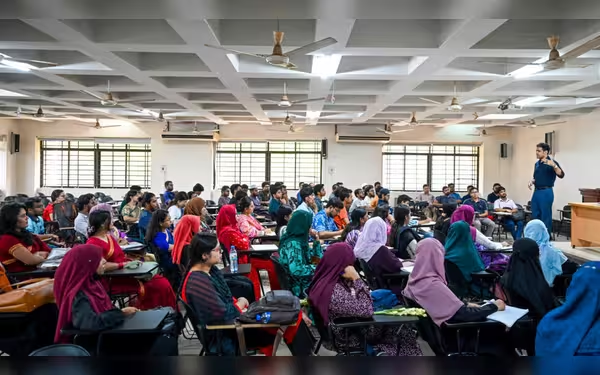Saturday, November 16, 2024 07:43 PM
Classes Resume at Dhaka University After Protests
- Classes resumed after prolonged protests at Dhaka University.
- Students express relief and joy upon returning to classes.
- Political changes follow protests, signaling hope for democracy.
 Image Credits: thefrontierpost
Image Credits: thefrontierpostClasses have resumed at Dhaka University following protests, marking a hopeful turn in Bangladesh's political landscape.
In a significant turn of events, classes have resumed at Dhaka University in Bangladesh after a prolonged shutdown that was triggered by a wave of protests led by students. These protests were not just about job quotas; they evolved into a larger movement aimed at ending the 15-year rule of the autocratic Prime Minister Sheikh Hasina. The unrest reached its peak in July, leading to a crackdown by authorities that resulted in the deaths of hundreds of individuals. The situation escalated to the point where the university campus was closed, leaving students in a state of uncertainty.
As students returned to their classes on Sunday, the atmosphere was filled with a sense of relief and joy. Many students, like Arpita Das, expressed their happiness at being back in the classroom after such a long break. "I feel so much better coming back to class after a long time," she remarked, highlighting the emotional toll the protests had taken on her and her peers. The return to classes felt like a celebration, with teachers welcoming students with flowers, creating a warm and inviting environment.
The protests that led to the university's closure were marked by intense clashes between students supporting the government and those opposing it. Arpita, who witnessed these confrontations firsthand, recalled the chaos of the protests, where rocks and sticks were used as weapons. "We were in so much uncertainty about whether we could resume class again and complete our studies," she added, reflecting on the anxiety that gripped the student body during the turmoil.
According to assistant proctor Mohammad Mahbub Quaisar, classes have resumed in nearly all departments, with only a few still on hold. He noted that students returned with a "joyous mood," eager to continue their education after the disruptions. The return to normalcy is a welcome change for many, especially after the widespread abuses reported during Hasina's regime, which included mass detentions and extrajudicial killings of political opponents.
In the aftermath of the protests, significant changes have taken place in the political landscape. Following Hasina's ouster and subsequent exile to India, several cabinet ministers and senior party members have been arrested, and her loyalists have been removed from key positions in the government and judiciary. This shift has led to a newfound sense of freedom among the students and the general public.
As students walk through the leafy streets of the Shahbagh neighborhood, they are greeted by vibrant murals that call for the destruction of oppressive systems and celebrate the country's "rebirth." Kalimulla Al Kafi, a master's student, shared his thoughts on the recent changes, stating, "Today it feels like I am attending classes with freedom." This sentiment resonates with many who have longed for a more open and democratic society.
The resumption of classes at Dhaka University symbolizes not just a return to education but also a broader hope for a brighter future in Bangladesh. As students embrace their academic pursuits once again, they carry with them the lessons learned from their experiences during the protests. The journey ahead may still be fraught with challenges, but the resilience and determination of the youth signal a promising path toward a more democratic and just society.













